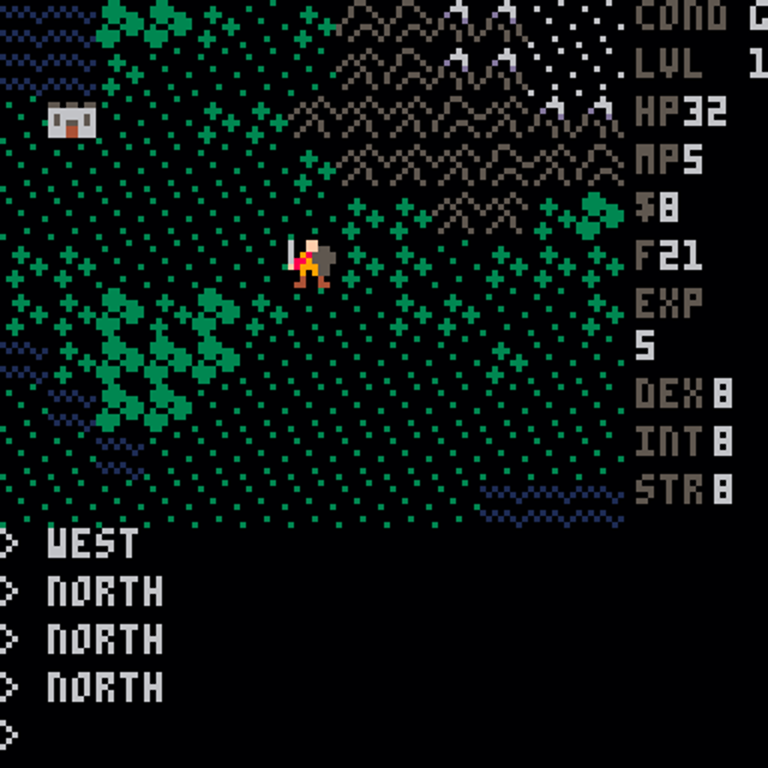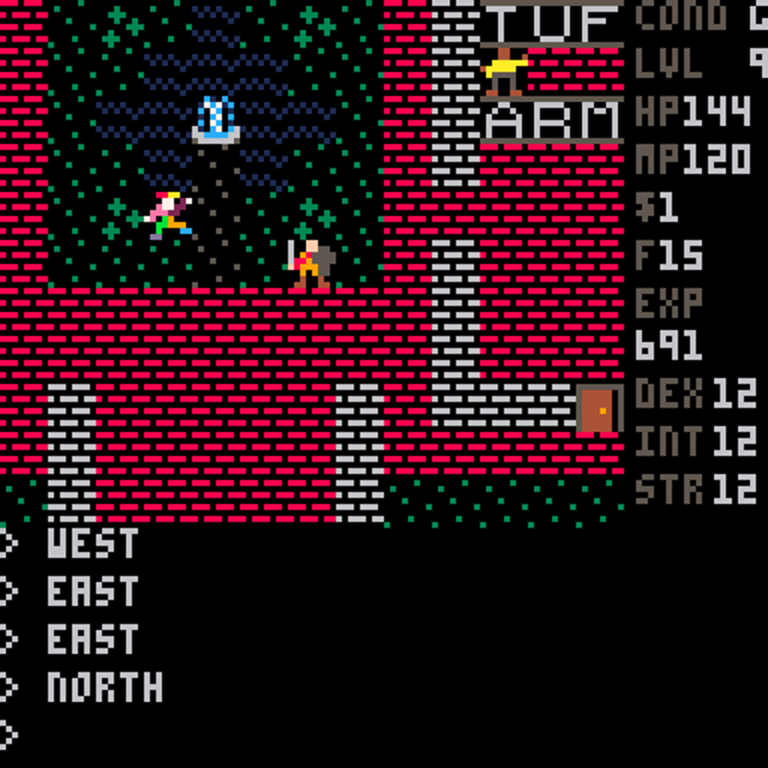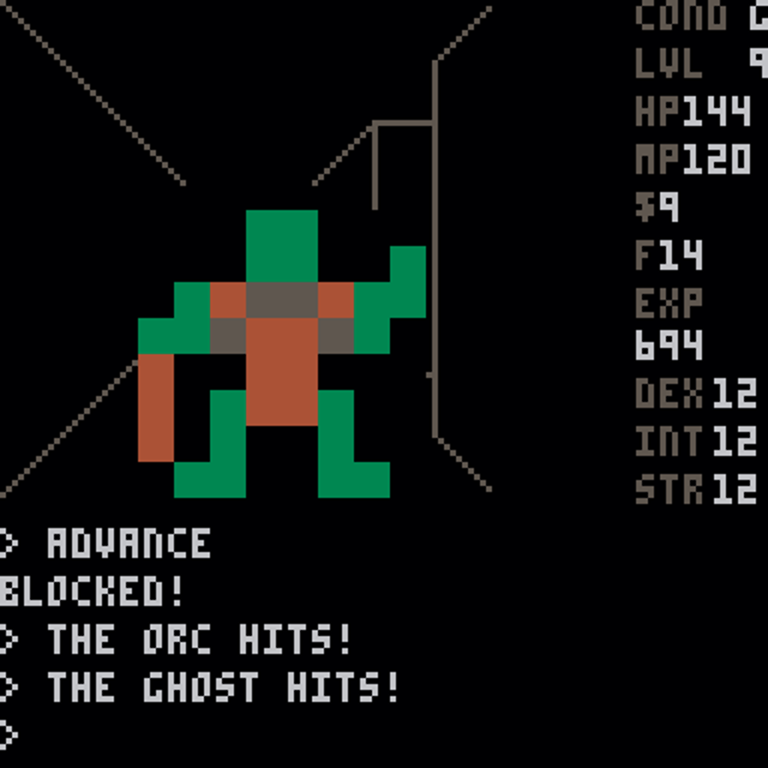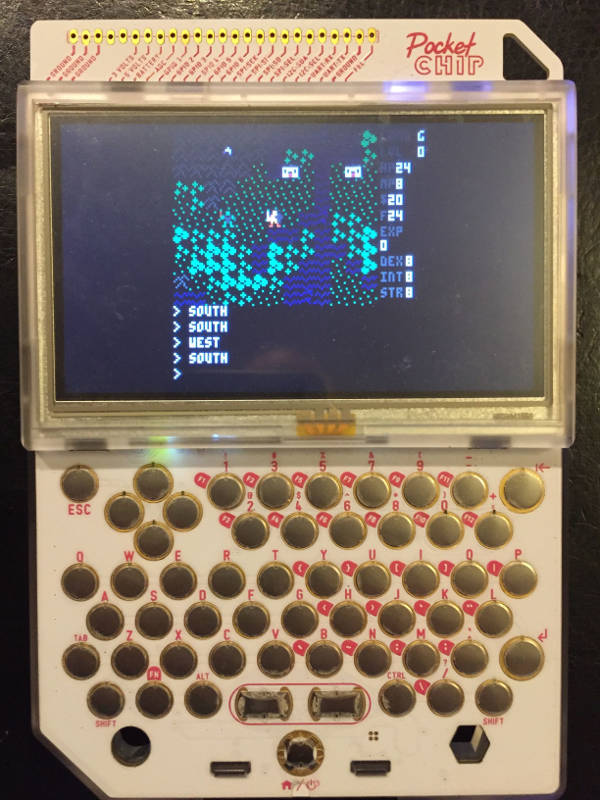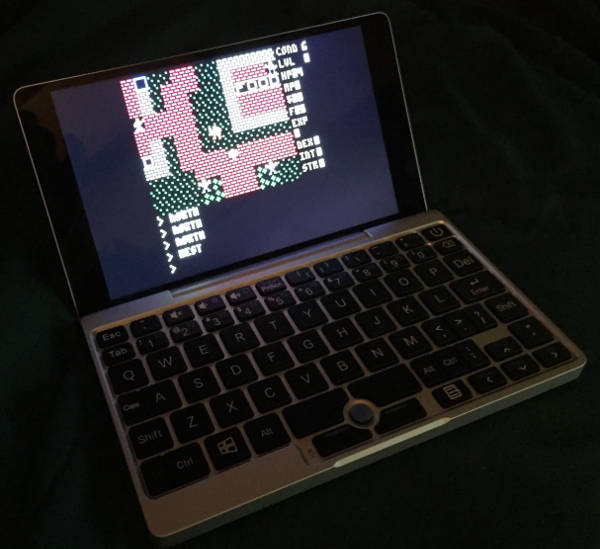My homage to the 8-bit Ultima games.
Minima is an adventure RPG in the style of the older Ultima games as played on the Commodore 8-bit computers. Just like the original Ultima games, it includes a world view, enterable towns, and 3D dungeon displays. It also features graphics, sound effects, and music that should help one recollect those classics. More importantly, it is a fully playable (and winnable) game with its own backstory, plot, setting, and characters.
You can play it online on the Minima at Lexaloffle page or play it directly through any PICO-8 environment by using the splore utility. You can also grab binaries for Linux, macOS, and MS-Windows through the release link or via the Minima Itch.io page.
Screenshot of the world view in Minima. There's a town to the northwest, mountains to the northeast, and plains to the south.
Screenshot of the town view in one of Minima's towns. A fountain, merchant, and jester are all present.
Screenshot of the dungeon view in one of Minima's dungeons. The player is being attacked by both an orc (shown directly ahead) and a ghost (from behind). Yikes!
Figuring this out is part of the game. You're in the land of Miskatonia and you start out within sight of a town and a dungeon. It's recommended that you try the town first. Also, you start off without any weapons or armor, and this is a very precarious situation to be in. You'll want to rectify it as quickly as possible. If you've not done so yet, you should peruse the manual and get some tips about surviving in Miskatonia and some warnings about the Faxon as well as basic information about game controls. If you are too impatient to skim through the manual, the basic game controls are accessible from within the pause menu of the game itself. Pressing the p key (or the enter key on some platforms) should bring up this menu.
As a kid I enjoyed playing the 8-bit Ultima games on the C64 and C128. First there was Ultima II with its multiple worlds, time-travel, and challenge in the Time of Legends. Then there was Ultima III with its smaller space but better graphics and gameplay, and its mystery around Exodus. Then came Ultima IV, with a much bigger space and much better story, and an early prominent use of the word "avatar". Then was the somewhat belated release of Ultima I for those who wanted more details on the backstory. Then came Ultima V, which not only improved upon the storytelling in Ultima IV, but also took great advantage of the C128 hardware and provided what I'd argue to be one of the best gaming experiences on the system. Then came Ultima VI, which was a disappointment on the C128 and essentially unplayable. The less said about that one, the better.
I never got into Ultima again after #6, but I still have fond memories of playing it. I noticed that GOG was making Ultima IV available again right around the same time I'd started tinkering around with PICO-8 on the PocketC.H.I.P., and while porting xu4 to the PocketC.H.I.P. as part of PocketInstaller, I got a wild idea: why not try to make a full game inspired by the old-school Ultimas within the restrictive limits imposed by PICO-8? This project is the result of my efforts, an homage to all the old 8-bit Ultima games, but especially numbers II through V.
This project is at version 1.1. It is completely playable from beginning to end.
Many features of the Ultima series as played on the C128 work. You can move around and explore the world map and enter towns and dungeons. Town views and dungeon views both work, and dungeons require torches to see. Looking at things and searching for things works. Checking status works. Creature movement and behavior works. Combat works in both world and dungeon views. Dialog with townies works. Purchasing in towns works. Spells work. Capturing pirate ships works, and with one it's possible to explore the waters of the world map. Leveling up works. Sound effects are in place. The in-game help screen works. Saving and loading games works, although it has some unavoidable limitations (most notably only the ship that your character is on will be saved). Background music works. Increasing attributes works. Fountains work. It's winnable.
Compared to the earlier version 1.0, version 1.1 features improved creature movement, guild shops with working keys and torches, more townies with more clues, openable treasure chests, more challenging dungeons, a tower puzzle, enterable shrines, and many minor bugfixes.
Due largely to the existence of chests and additional dungeon levels, this version requires less grinding than version 1.0; due largely to the existence of more characters, this version has a bit more story. It is much closer to what I had set out originally to build.
Minima will run everywhere that PICO-8 runs. By design it does not require the latest & greatest version of PICO-8, so it'll even run on PocketC.H.I.P.
Photograph of Minima running on a PocketC.H.I.P.
Photograph of Minima running on a GPD Pocket Ubuntu Laptop
The constraints of building something within the PICO-8 environment make a project like this fairly tough. This game pretty much maxes out PICO-8 capacity; there's not a lot of space left and I'd likely have to trim out some already-present features to shoehorn in anything else. All the PICO-8 graphic space (both for sprites and maps) are fully used. All but a couple of the sound effects slots are used. The final version here is a careful balance between maxing out the token count and the compressed size. The raw size is already too large to fit without minimization, too, and even with that many manual tweaks are required making the code quite ugly in places.
Normally PICO-8 applications are written in a special dialect of Lua and are immediately interpreted within the PICO-8 environment without any special build steps. Minima is a little larger and more complicated than most PICO-8 applications, and it is too large to run directly without a special minimization step. The picotool utility does most of what's needed, but at the moment unless this special branch of picotool is run with the luamin2 argument, it'll break Minima.
You can also substitute in triplefox's version of the music. It's less like the original Commodore versions of the Ultima games but does a better job of making the most of what is available within the PICO-8 environment. It's in the alt_music.p8 file. To use it, just copy over the existing __sfx__ and __music__ sections in minima.p8 with the corresponding versions found in alt_music.p8.
Minima is mostly data-driven. It uses a JSON data structure to define the people, creatures, and objects, and another JSON data structure to define all the maps and dungeons. Command sequencing uses coroutines in order to avoid overly-complicated state machines. The "Minima Engine" can be reused for another game without having to modify too much code; if the target game is in a similar world to Miskatonia, not much more than the victory conditions would need to be changed on the code side. As of this writing, at least one other game makes use of the Minima Engine.
I build this with lots of respect and love for the original Ultima series. I make no claims of any rights to any of the intellectual property associated with it. Hopefully even my choice of naming this "Minima" (as opposed to "Ultima", get it?) helps convey this notion.
The graphics and sound effects in it are based on my undoubtedly incomplete memories of the original games and are deliberately trying to convey the feel of playing those games on the C64/128 as I experienced them, not be pixel-perfect representations of what they really were. I've drawn everything by hand and created the sound effects on my own, so while they have all been strongly influenced by those original games I expect they'll look quite a bit different if compared side-by-side, so please don't bother to complain if you don't think something looks or sounds quite right.
The music is an attempt to recreate a little of the music that appeared in the Commodore version of Ultima III. This was done with a combination of viewing various scattered notes I found online with listening to recordings of the Commodore SID files. I couldn't fully match the time signatures used as the originals are fairly long, fairly complex, and do some pretty clever things. They also occasionally go outside the pitch range available to PICO-8. Again, it's more about capturing the spirit than being a faithful recreation.
This version makes use of Tyler Neylon's json.lua routine to parse JSON data; thanks to freds72 for his reference to it.
The additional Lua utility script convert.lua is used to make it easier to lay out a dungeon map and turn it into something the game can use.

